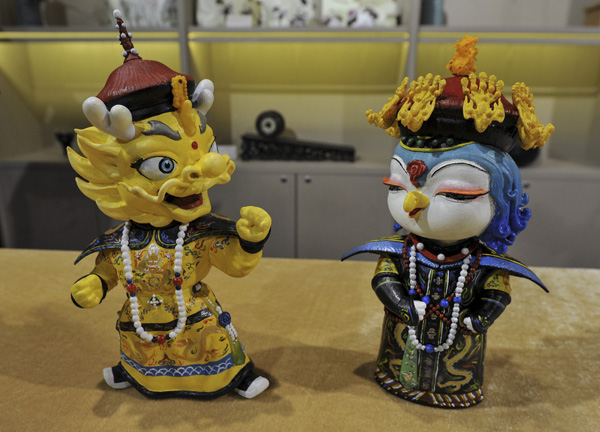Creative souvenirs a new 'benchmark'
 0 Comment(s)
0 Comment(s) Print
Print E-mail China Daily/Xinhua, May 22, 2017
E-mail China Daily/Xinhua, May 22, 2017
|
|
|
Mascots of Beijing's Palace Museum, Zhuangzhuang (left) and Meimei. [Provided to China Daily] |
Lei Shiyi, a college student from Chongqing, bought two bookmarks from the souvenir store inside the Palace Museum, commonly known as the Forbidden City.
"It feels like I'm taking part of the Forbidden City back home," Lei said.
The museum's creative endeavor began in 2007 when it produced souvenirs for the 2008 Beijing Olympics. Over the next decade, it produced more than 9,600 items featuring the imperial palace and its exhibits - silk scarves, for instance, in the patterns of emperors' dragon robes, or Chinese checkers sets drawing their inspiration from the roof. The museum boasts nearly 2 million antiques in its collection.
"It is a museum's mission to connect cultural products with people's daily lives, and to uphold cultural values," said Shan Jixiang, director of the museum.
"In the past, souvenirs that were sold at the Palace Museum emphasized history, knowledge and the arts, but they lacked novelty and originality," Shan said.
"Currently, they don't meet the demand of customers, young people in particular. We have to find a better way to show customers the Palace Museum's cultural significance," he said.
Yang Xiaobo, head of the museum's business management division, added, "The museum's products are popular with tourists, which is a point of pride and inspires us to develop more."
The souvenirs are popular overseas. More than 200 items, including notebooks with covers based on embroidery, as well as tape featuring calligraphy and artwork, appeared at this year's Paperworld, a leading international stationery fair in Frankfurt, Germany.
They were an instant hit, and many international dealers asked to collaborate with the museum. "Promoting Chinese culture worldwide is our duty," Yang said.
The National Museum of China, one of the largest museums in the world, began a similar project in 2011.
The museum has come up with more than 3,000 products, and it had racked up 2.3 billion yuan ($334 million) in souvenir sales as of last year.
"The National Museum aims to serve as a benchmark in commercial creativity for Chinese museums," said Jiang Mingwei, deputy manager of the museum's souvenir department.
The museum is working with the Shanghai Free Trade Zone and e-commerce giant Alibaba to build a platform to design, produce and sell creative souvenirs globally.
"Chinese museums are leading a trend in cultural innovation," Jiang said.






